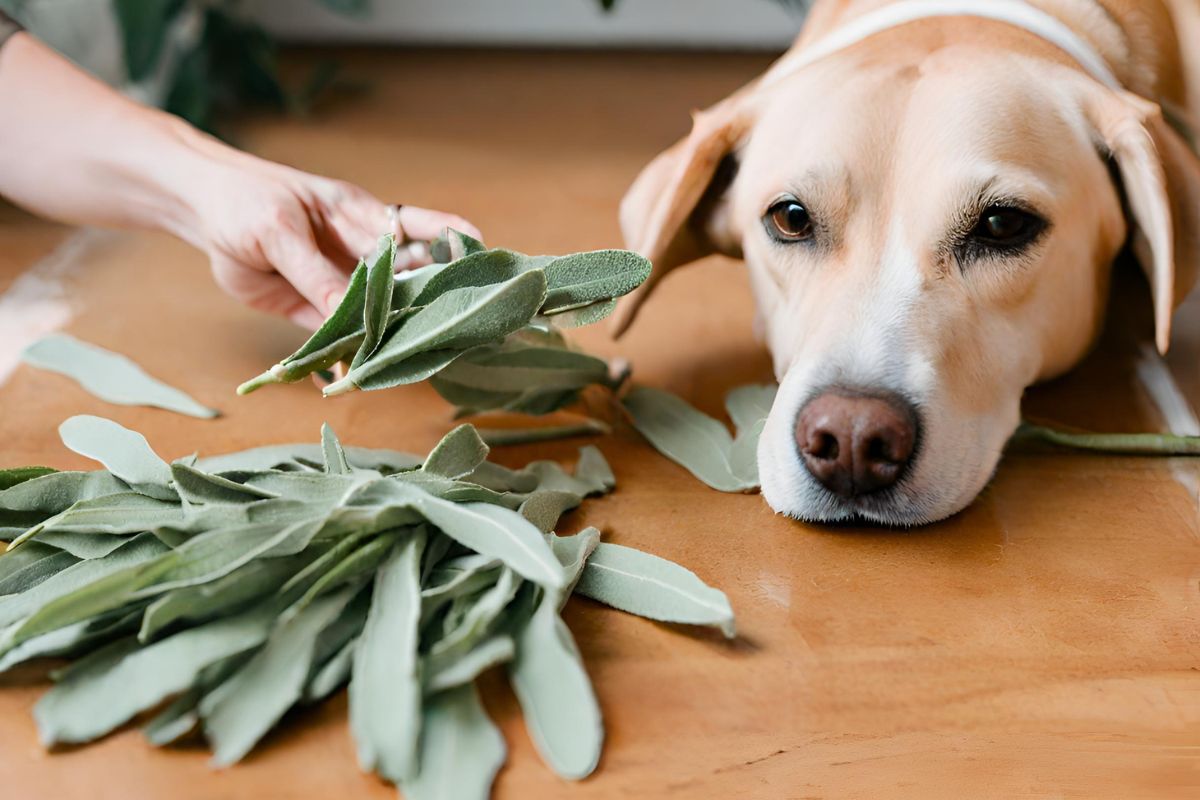Can dogs eat sage? Short answer, yes, it’s typically safe to give Fido this popular herb. As with anything dogs can eat, though, there are caveats. Read on to learn more, and to find out if sage is even good for your pup!

Can Dogs Eat Sage
Sage, which belongs to the Salvia genus and is native to the Mediterranean region, has a long history of culinary and medicinal use in traditional herbal medicine. known for its distinct flavor and aroma.
In cooking, sage is often used as a seasoning for various dishes, particularly in Mediterranean and Italian cuisines. Known known for its distinct flavor and aroma, sage leaves have a slightly bitter and earthy flavor with a hint of mint and citrus. It can be fresh or dried, and it pairs well with meats, poultry, stuffing, sauces, and soups.
Beyond its culinary uses, sage has also been used for its potential health benefits. It is believed to have antioxidant, anti-inflammatory, and antimicrobial properties. In traditional medicine, sage has been used to soothe digestive issues, improve memory and cognitive function, and relieve sore throats.
It’s important to note that while sage can offer certain health benefits, it should be used in moderation and as part of a balanced diet. But the real question is: is sage safe for dogs?
Sage is generally considered safe for dogs to consume in small amounts. It is not toxic to dogs. However, there can be some issues.
Let’s look at a few of the potential benefits of feeding your dog sage. Then, we’ll go over the drawbacks and possible side effects.
Benefits of Sage for Dogs
Before we look at the potential benefits, I just need to remind you that this is NOT medical advice. Always talk to your vet before trying herbal remedies for dogs.
Anti-Inflammatory Properties: Sage contains compounds with anti-inflammatory effects, aiding in reducing inflammation in dogs.
Rich in Antioxidants: Packed with antioxidants, sage helps combat oxidative stress and promotes overall well-being in your furry friend.
Digestive Support: Sage may aid in digestive issues, providing relief from indigestion or an upset stomach in dogs.
Immune System Boost: The presence of vitamins and minerals in sage may support a robust immune system for your canine companion.
Calming Effects: This popular herb may have calming effects, making it potentially beneficial for anxious or stressed dogs.
Rich in Nutrients: It offers essential vitamins and minerals, contributing to the overall health and vitality of your dog.
Fights Free Radicals: The antioxidants in sage may help neutralize free radicals, promoting long-term health for your pet.
Oral Health: Its natural antimicrobial properties contribute to maintaining good oral hygiene in dogs. You can even add it to our Homemade Minty Breath Biscuits Recipe for Dogs!

Side Effects of Sage for Dogs
As with just about anything that dogs can eat, there are drawbacks to feeding Fido sage.
Allergic Reactions: Some dogs may be allergic to sage, leading to symptoms such as itching, swelling, or respiratory issues. See below for more info.
Gastrointestinal Upset: Dogs have different digestive systems than humans, and certain herbs and spices may not agree with them or could cause gastrointestinal upset. Consuming large quantities of sage can irritate a dog’s stomach lining, leading to vomiting, diarrhea, or abdominal discomfort.
Central Nervous System Effects: Excessive consumption of sage could potentially affect a dog’s central nervous system, leading to symptoms like drowsiness or lethargy.
Potential for Toxicity: Certain varieties of sage, particularly in essential oil form, may be toxic to dogs if ingested in significant amounts.
Blood Clotting Issues: Sage contains compounds that may impact blood clotting, posing a risk for dogs with bleeding disorders or undergoing surgery.
Photosensitivity: Some dogs may experience heightened sensitivity to sunlight after consuming sage, leading to skin reactions.
Drug Interactions: Sage may interact with certain medications or exacerbate existing health conditions in some dogs. Talk to your vet before giving it to Fido, especially if your dog has underlying health concerns or is on medication.
Pregnancy Concerns: Pregnant dogs should avoid sage as it may have uterine-stimulating effects, potentially affecting the pregnancy.
If you want to give sage to your dog, it’s best to do so in moderation and as part of a balanced diet. Including small amounts of herbs like sage as an occasional treat or flavor enhancer should generally be fine for most dogs. Watch for any signs of digestive upset or allergic reactions when introducing new foods to your dog.
Remember that while some herbs and spices can offer certain health benefits, it’s essential to provide your dog with a well-rounded and nutritionally complete diet that is appropriate for their specific needs.

Are Dogs Allergic to Sage?
Yes, some dogs can be allergic to sage, just as they can be allergic to other herbs or plants. Allergic reactions in dogs can vary in severity and may manifest as skin irritations, itching, redness, swelling, gastrointestinal upset, or respiratory issues.
If you suspect your dog has an allergy to sage or any other herb, it’s best to consult a veterinarian. Veterinarians can perform allergy tests or recommend an elimination diet to identify the specific allergen and develop an appropriate management plan for your dog.
Typically, dogs suffer from food allergies. According to the National Institutes of Health, food allergies in dogs result from an immune-mediated hypersensitivity reaction to dietary proteins and manifest as various dermatologic and/or gastrointestinal clinical signs.
For more information about allergies for your own research check out our post, Food Allergies in Dogs: The Definitive Guide.
It’s worth noting that allergies to herbs or spices in dogs are relatively rare compared to common food allergens such as certain proteins or grains.
However, every dog is unique, and individual sensitivities can vary. If you notice any signs of an allergic reaction after your dog consumes sage or any other herb, it’s best to avoid giving it to them in the future.
Other Dog-Friendly Herbs
There are several herbs safe for canine consumption that can offer potential health benefits.

Parsley
Fresh parsley is often recognized as a natural breath freshener for dogs due to its ability to neutralize odors. It contains chlorophyll, which can help mitigate unpleasant breath odors in dogs when incorporated into their diets.
Parsley is rich in vitamins A and C. Vitamin A contributes to healthy skin, coat, and vision in dogs, while Vitamin C supports the immune system and acts as an antioxidant.
Basil
Basil contains antioxidants and can provide a flavorful addition to dog treats or meals in small quantities. Basil contains nutrients like vitamins A and K, as well as antioxidants such as flavonoids and polyphenols, which can be beneficial for dogs.
The antimicrobial properties in basil might help in combating certain pathogens that could be causing digestive problems in dogs.
Thyme
Thyme has antimicrobial properties and may help with gastrointestinal issues. This herb is known for its antimicrobial properties. It contains compounds such as thymol, carvacrol, and other essential oils that exhibit antimicrobial, antifungal, and antibacterial properties.
Oregano
Oregano contains compounds like carvacrol and thymol, which possess antibacterial and antifungal properties.
These properties may help combat certain bacteria and fungi, contributing to improved gastrointestinal health in dogs. Moreover, oregano contains antioxidants such as flavonoids and phenolic acids.
Conclusion
Herbs can be safe and even offer potential health benefits for dogs when introduced in moderation and as part of a balanced diet. Sage, in particular, is not toxic to dogs but feeding excessive amounts may lead to gastrointestinal upset or potentially exacerbate certain health conditions.
While these herbs contain antioxidants, antimicrobial properties, and nutrients that may support a dog’s health. It’s crucial to be attentive to any adverse reactions, especially allergic responses or digestive issues, when introducing new herbs into a dog’s diet.
Always consult with a veterinarian before incorporating herbs or any new food into your dog’s diet, especially if your dog has existing health concerns or is on medication.
Monitoring your dog’s reaction to these herbs and ensuring they’re included as occasional treats or flavor enhancers can be a great way to add variety to your dog’s meals while supporting their well-being. Add flavor and some variety! Happy cooking with you and your pooch!


